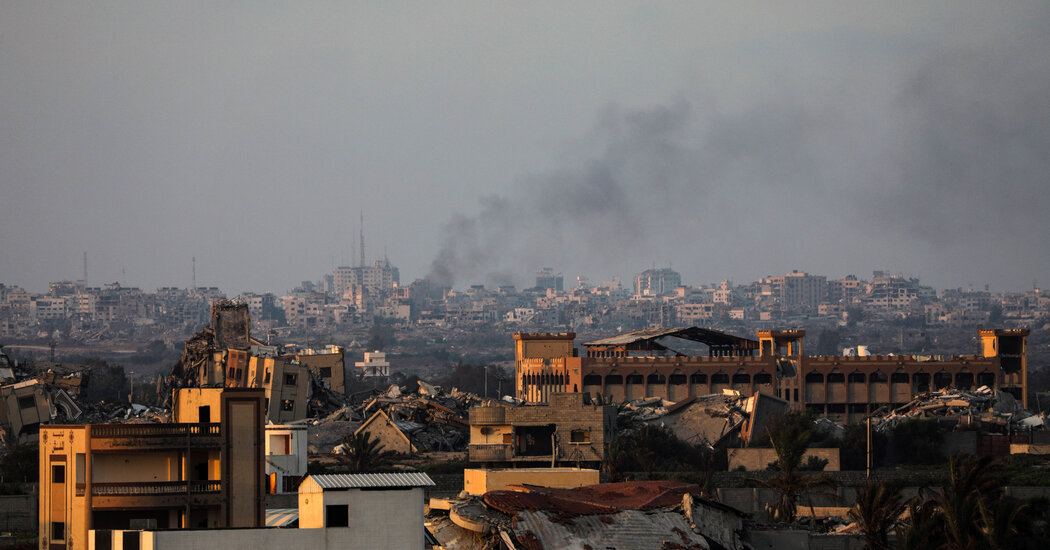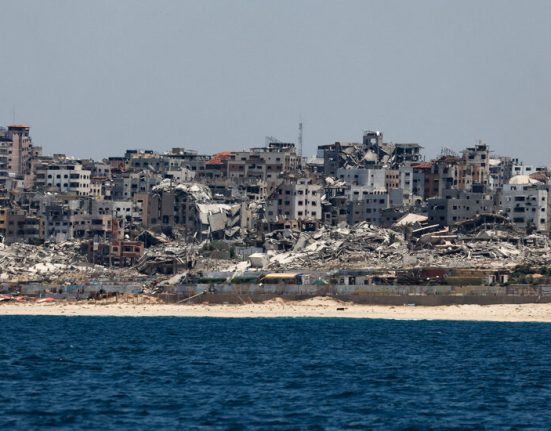With the Israeli-occupied West Bank facing deepening economic woes, Israeli officials said on Friday that a far-right minister had tentatively agreed to release some frozen funds to the financially embattled Palestinian Authority in exchange for strengthening Israeli settlements in the territory.
Bezalel Smotrich, the country’s hard-line finance minister, has sought to cripple the Palestinian Authority, which administers some West Bank areas under Israeli military rule, and believes Israel should rule the territory forever. He has withheld hundreds of millions in funding for the Palestinian Authority and threatened to allow a waiver protecting Israeli banks that deal with Palestinian ones to elapse.
To mollify Mr. Smotrich, cabinet ministers agreed in a late-night meeting Thursday to measures including retroactively authorizing five Israeli settlement outposts in the West Bank that had been built illegally, according to Mr. Smotrich’s office and two other Israeli officials who spoke on condition of anonymity to discuss sensitive cabinet deliberations.
In exchange, Mr. Smotrich would agree to release some funds for the authority and extend the banking waiverֿֿ, the officials said, although he has not yet announced the moves. But even if that temporary reprieve is carried out, Mr. Smotrich could demand still more concessions down the line.
The details and timeline for legalizing the five outposts were not immediately clear. While much of the international community views Israeli settlements in the West Bank as a violation of international law, outposts are illegal under Israeli law; authorizing them allows them to grow and expand legally.
As the Israeli military campaign grinds on in Gaza, an economic crisis is unfolding in parallel in the West Bank, where tens of thousands were rendered jobless by the war, Palestinian civil servants have not been paid in full for months and near-daily Israeli raids have disrupted even basic travel.
Mr. Smotrich has wielded his position to deal blow after blow to the Palestinian Authority, which administers some West Bank areas under Israeli occupation. He has withheld a majority of the Palestinian government’s budget, threatening not to renew a crucial waiver protecting Israeli banks that work with Palestinian counterparts.
The measures have alarmed the Biden administration, which wants the Palestinian Authority to have a role in running postwar Gaza. U.S. officials also worry that an economic crash in the West Bank could lead to a surge in violence in the territory, which has yet to see a mass uprising despite months of deadly Israeli military operations.
The Palestinian Authority has drifted from crisis to crisis for years, struggling to pay its arrears amid dwindling international aid. Israel has often withheld taxes it collects on the authority’s behalf in an attempt to penalize its leadership. At other times, Israel has sent tens of millions of dollars to keep it afloat.
But many called the West Bank’s current economic predicament the most difficult yet.
After the Hamas-led attack on Oct. 7, tens of thousands of Palestinians who had worked in Israel were no longer allowed to enter, creating mass unemployment overnight. Israeli military raids, road closures and stricter checkpoints have further choked the Palestinian economy.
Before the war, Mahmoud Abu Issa, 53, was earning over $2,000 a month — an enviable salary in the impoverished West Bank — as a construction worker in Israel. He has been unemployed since Israel barred most Palestinian workers, except for irregular stints as a day laborer for around $10 per day.
His son, who worked with him in Israel, had begun building a house before the war began. Since their wages dried up, the house remains unfinished, he said.
“We sit around day and night, hoping for something to change,” Mr. Abu Issa said. “But there’s nothing.”
Under agreements between the two sides, Israel collects and transfers hundreds of millions of dollars in tax revenue to the Palestinian Authority. Mr. Smotrich has withheld those funds, which constitute a majority of the Palestinian government’s budget, exacerbating its fiscal crisis.
As a result, the Palestinian leadership constantly struggles to pay its employees, who number at least 140,000, according to Palestinian Authority Finance Ministry officials. Many have only received partial salaries, often at irregular intervals, for years; last month, most received just 50 percent of their wages.
Shadi Abu Afifa, a father of four who lives near Hebron, saw his $930 monthly salary as an officer in the authority’s security forces slashed in half last month. He said his family had stopped buying cooking gas and abandoned other modest luxuries, like internet at home, in an attempt to save money.
“If the economy improves, we might start to feel some hope again,” said Mr. Abu Afifa. “Because right now, we’re in a bad, suffocating situation — the war, the unemployment, everything on top of one another.”
U.S. officials have pressured the Israeli government to release the funds, fearing that further economic hardship could lead to more violence in the West Bank. Jake Sullivan, the national security adviser, called this week for the funds to be released “without further delay.”
Last month, after three European countries announced they would recognize a Palestinian state, Mr. Smotrich announced that he would not renew the waiver — set to expire July 1 — that protects Israeli banks from legal liability for working with Palestinian banks.
Lacking their own currency, Palestinians generally use Israeli shekels. If Palestinian banks want to offer shekel accounts, they must maintain links with Israeli banks and rely on them to process shekel transactions.
Since 2017, Israel’s Finance Ministry has issued the waiver indemnifying the Israeli banks, according to Lilach Weissman, a spokeswoman for the ministry. If the waiver is not renewed, Israeli banks would likely cut ties with their Palestinian counterparts, banking experts said.
“The ramifications would be bad and dangerous for everyone,” said Akram Jerab, the chairman of the board at Quds Bank, which has 31 branches in the West Bank.
At a cabinet meeting late Thursday that went past midnight, Mr. Smotrich agreed to temporarily extend the waiver for four months, said Eytan Fuld, a spokesman for the minister. It was unclear what would happen after that.
If he ultimately follows through with his threat to let the waiver elapse, it could also have economic consequences for Israel, experts said. Palestinian merchants would not be able to use banks to pay Israeli suppliers for imported goods. And there would be no way for Palestinians to pay Israel for essential goods like fuel, water and electricity, said Azzam al-Shawwa, a former top Palestinian banking regulator.
“Israel’s commerce is intertwined with Palestine,” Mr. al-Shawwa said in an interview. “Palestine is one of the biggest traders with Israel. Is Smotrich ready to lose that?”
Rawan Sheikh Ahmad contributed reporting.













